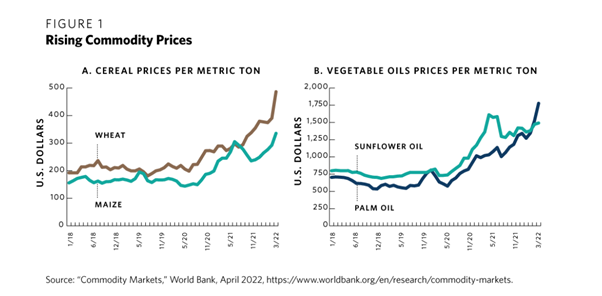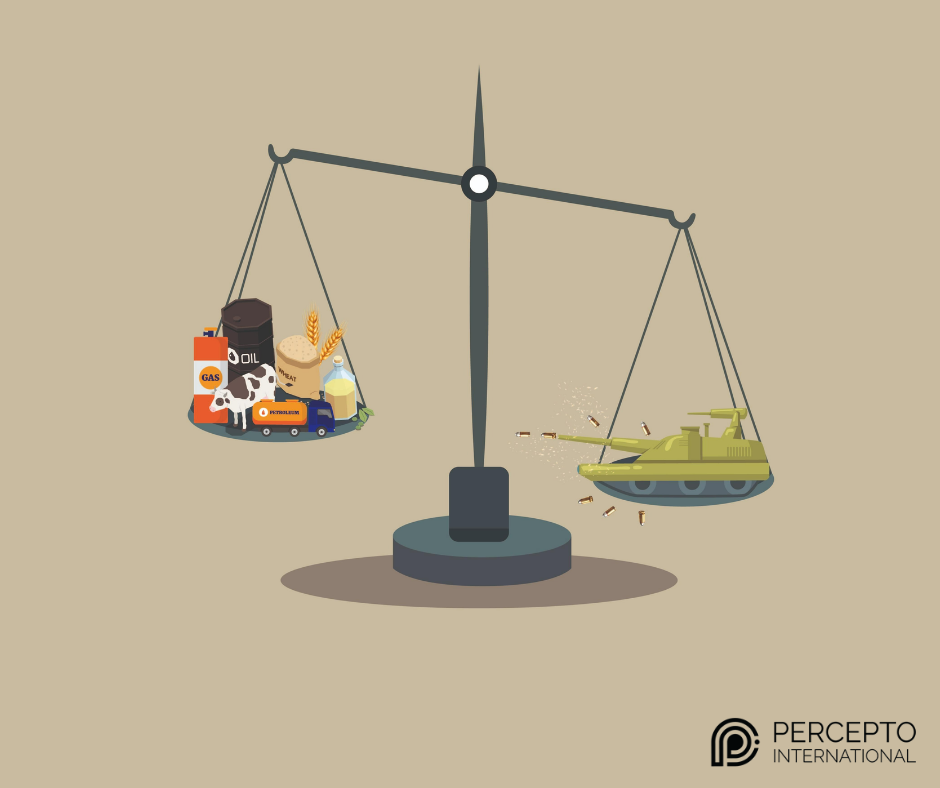The War in Ukraine is Causing Damageable Effects on Developing Economies
On April 1st 2022 former Russian president Dmitry Medvedev published on his official Telegram channel that Russia will “supply food and crops only to [its] friends” because the food is its “quiet weapon” (“наше тихое оружие”) — confirming Russia will not hesitate to weaponize its export of food commodities.

World Bank, April 2022
When Former President Medvedev weaponized food supply, he knew very clearly how much the demand in grains constitutes a strategic leverage on the global geopolitical scene. It appears that the war in Ukraine, in addition to having a major impact on global markets, has specific consequences aimed at arming fragile nations (mostly African countries) as a means to pressure the West.
In addition to the weaponizing of food commodities, fuel prices have almost doubled, and the cost of many primary resources has also gone up dramatically, leading to a disrupted supply chain and a dramatic increase in prices. As most African countries extensively depend on food imports, their economic situation, already hit by the Covid pandemic’s consequences, has been more affected compared to other countries.
On a macro-economic level, many third-world countries also saw their debt significantly grow. The overall situation led some countries to risk going default on their foreign loans (Ghana or Tunisia for example). This deteriorated financial situation affected national reserves and caused once again a surge in inflation. The implication for the population is a rise in basic products’ prices and a drop in purchasing power.
From Economic Crisis to Food Insecurity
According to the World Food Programme, more than 800 million people were in the situation of insufficient food intake in April 2022. Moreover, the food crisis could impact more significantly the prices of basic foods in a dozen African countries, including Burkina Faso, Niger, Sierra Leone, and Mali.
Some countries have already been in the state of concerned food insecurity before the beginning of the War in Ukraine, with more than 50% to 70% of their population barely providing for their needs (Cameroun, Kenya). In the latter, the cost of basic goods escalated dramatically, with cooking oil price increasing by 6.5 percent between February and March 2022, as an example.
The level of inflation some countries are experiencing is worrying and might put the population in an even worse situation. For example, yearly food inflation reached 17.2% in Nigeria in March whereas prices of grains could see a 30% rise.
In brief, the future of some countries seems to be at increased risk as they remain unable to feed their population.
From Hunger to Anger
The incapacity of governments to properly manage their economic resources and provide for their population’s needs has led to ever-growing frustration. The economic crisis worsened by the war in Ukraine accentuated existing challenges regarding food security and economic development. Many governments took controversial policies, most of the time implying tapping into national reserves and increasing foreign debt. These policies, aggregated to current peaks of fuel and basic goods prices, left these countries with few options to feed their population.
As the Carnegie Endowment highlights “The link between food insecurity and stability is well established”. The starving population has nothing left to do but its anger to manifest. More and more people are using social media as a tool to criticize and condemn governments’ activities. Some of them are posting their thoughts spontaneously, some others seem to promote an emerging anti-government campaign.
For example, in Sri Lanka the phenomenon has taken an unprecedented scale recently with the emergence of grassroots movements supporting a deep political change, leading to mass street protests — that the local police is barely able to repress (see Tweets below) — and to the resignation of the Prime Minister.

Posts from Twitter — From May 10 until May 22, 2022
Some other countries see their existing internal issues such as religious conflicts, tribal tensions, and generalized insecurity being completely exacerbated, as is the case in Nigeria. In this case, the government seems to have problems controlling the population, whose anger is expressed either through violent incidents across the country or on social media, by criticizing political leaders. Recent incidents have shown that the country is now on the verge of implosion and that urgent measures must be taken to prevent it from falling into a state of chaos.
Many observers already see the Sri Lankan scenario (including the default on its debt) as a pattern that could apply to many others in the near future, especially in Africa, including Ghana, Zambia, Zimbabwe, and Nigeria, (see tweets below) causing not only major economic and humanitarian repercussions, but also leading to popular protest and political instability.
People start feeling they have nothing to lose anymore, and lash out on the Internet. Popular unrest and police mismanagement cause a loss of authorities’ legitimacy and the progressive disappearance of their deterrence — leading to political instability.

Posts from Twitter — From May 10 until May 22, 2022
Looking Forward
We expect the global economic situation to worsen over the coming months, if not years, especially with the war in Ukraine lingering on, not close to a definitive outcome.
The economic outcomes are both macro and micro in nature, with both a rise in national debt, straining national budgets, in addition to rising inflation rates, amassing a greater burden on households, especially with the rising of food prices.
The hybrid effect of both increased macro and microeconomic pressure will be felt much more in least-developed countries, the majority of them located in Africa and Asia / South-east Asia. The first country to default on its debt coinciding with the ramifications of the war in Ukraine was Sri Lanka.
The situation in the African continent is much more challenging, given base problems the continent faces, including climate issues — effecting water and food security, growing insurgent insecurity and growing instability — with six (!) non-democratic regime takeovers in the past year — Tunisia, Mali (2nd coup), Guinea Conakry, Burkina Faso, Sudan (2nd military coup) and Chad (president assassination). The economic situation has also led to a democratic regime change in Zambia, following the country’s default on debt and inflation.
The continent is also being contested by global powers, who aim at gaining influence and control over the continent’s vast resource potential and future growth. Most notable is the Russian ‘offense’ on the continent, which has both a physical component — mainly Wagner group mercenaries in various countries and a massive online influence effort — targeting France and lately, following the war in Ukraine — the west and the US.
All this is leading the continent, already undergoing a phase of instability, to an even more volatile stage, posing growing constraints and challenges the democratically elected governments. The past few years have shown that governments lack the know-how and capabilities to cope with these events, which have an international — regional — local context and require leadership and multiple decisions and actions at an ever-growing pace.
What Can Be Done
The solution to the impending crises is challenging, complex and requires the pro-active involvement and cooperation of the countries themselves, the regional institutions as well as international intervention — countries and institutions, such as the IMF. The implications are of a huge magnitude, not only for the future of the countries in need but also for the future of western interests and in a broader sense — democracy and democratic values vs. autocracy.
To avoid economic and humanitarian crises and threaten the stability and future of their country, rulers must adopt a comprehensive solution — ISI — Intelligence — Strategy — Influence.
First and foremost, elect governments need to adopt a pro-active comprehensive strategy, based on the essential goal of keeping their citizens out of immediate harms-way and improving their living conditions. This crisis, which has hit the global economy, should be seen as an opportunity, to make changes to fundamental flaws within the local economy, with the aim of making it more competitive and relevant to the local and global economy. Governments, reluctant to make such changes, fearing the repercussions from the general public, should use this window of opportunity to make the necessary reforms, ‘blaming’ it on external circumstances (other than their own wrongdoing), which require immediate painful but necessary measures.
Second, governments need to communicate their strategy and actions effectively. The days in which governments communicated solely through official national channels — state-operated TV and radio stations and newspapers is long gone. This is true to almost all the developing countries, even in those with a relatively low internet and social media penetration. The reason is that even in these low penetration countries, non-official news and information is being consumed in the major cities and by the young population, who then forward information by means of messaging apps, such as WhatsApp. Elect governments can no longer rely solely on their official channels of dissemination.
A reform must be made by the governments, in which they need to revamp the way they communicate with their subjects and broader target audiences. Creation of digital channels is key, with social media in the forefront — Facebook, Telegram, Tiktok, Instagram and even Twitter (mainly for communicating with international stakeholders). Much more content should be created and disseminated, flooding the digital sphere, with content type tailored to the general public. Influencers should be ‘recruited’ and serve as ambassadors to the government. The digital channels should not only be used to promote the agenda but also to be reactive to opposition hotspots, current and new.
Finally, governments should improve their Intelligence capabilities, in order to monitor both the general population and target subversive elements who wish to undermine the current regime. The recent coup d’états in the African continent can be characterized by growing public frustration and discontent with the regime, heavily vocalized on social media and with growing on-ground protests, giving the necessary tailwind for a coup — by military personnel — usually from young medium ranking officers (Lieutenant Colonel — Colonel).
It is necessary to understand where the public is communicating, who is leading the discourse, how many are vocal / in support, what is the public sentiment, is there a shift from vocalizing to call-to-actions etc. Governments must have this information in order to improve their decision-making process, improve their communication and to react in a timely manner to growing threats. In parallel, knowing the sentiment within the security / military establishment is crucial, as well as spotting and targeting elements who wish to undermine the government.
Effective implementation of the ISI concept can greatly contribute to governments’ handling of the current and future challenges they face in light of the ongoing war in Ukraine. The earlier governments comprehend and acknowledge the situation and take proactive actions, the more likely they will have the chance of coming out on top, subverting potential risks.
By Royi Burstien and Lea Abramski



Leave A Comment